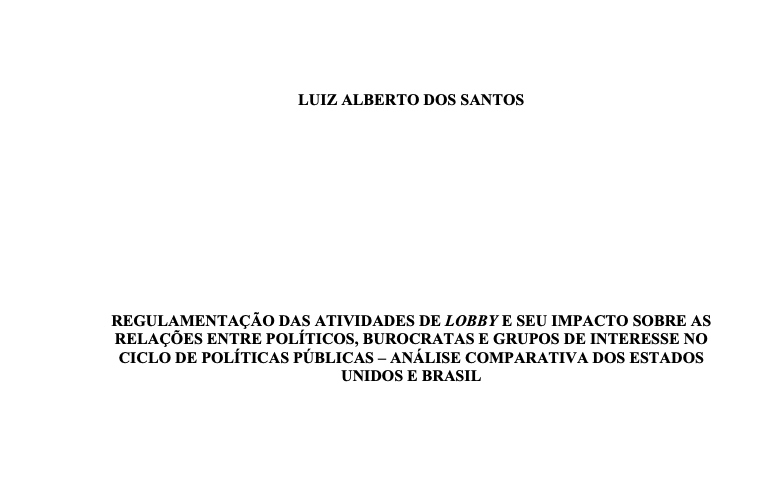
The Blogs and the Mensalão Crisis: New Standards in Political Coverage
22 de November de 2005UNLIKELY JOURNEY: THE STORY OF RENOVABR, THE SCHOOL THAT WANTS TO CHANGE POLITICS IN BRAZIL
7 de April de 2011Regulation of Lobbying Activities and Their Impact on Relations Between Politicians, Bureaucrats, and Interest Groups in the Public Policy Cycle: A Comparative Analysis of the United States and Brazil

This Thesis approaches the behavior of the interest groups and its interactions with the bureaucracy and the politicians in the scope of the political systems of Brazil and the United States of America, aiming to make a comparative analysis of the respective pressure systems and the activities of lobbies in two distinct contexts regarding to the regulation, monitoring and control of these activities, especially taking in consideration the fact that U.S.A. is the country that has the most complete and extensive lobby regulation in the world. This approach aims at, besides identifying the possibilities of the implementation of a lobby regulation in Brazil in the molds adopted in U.S.A., to contribute to surpass the deficit of comparative studies between the two countries, mainly considering the existing similarities in the respective pressure systems, mitigated for the strong inheritance of the state corporatism implemented in Brazil since the decade of 1920. The research problem relates to the effects of the legislation oriented to regulate the activities of the lobbies and the performance of the interest groups in its relations with the Legislative and Executive on the levels of transparency relations of relationship between these groups, politicians and the bureaucracy, as well as the degree of equality of access of the groups to the decisionmakers in the public policy process. From the examination of the existing situation in Brazil, especially the aspects related to the constitution and formatting of the political and systems and of the trends to increase participative democracy, had been defined two main hypotheses and two secondary hypotheses, proposing affirmative answers to the problem regarding to the effects in the enhancement of transparency as a result of the existence of lobby laws to regulate the lobby activities the interactions between interest groups, politics and bureaucrats, and the increase isonomy in the access of the groups to the decision makers as effect of this legislation. From the examination of the United States and Brazil in the matter, on the basis of ample bibliographical research, involving theoretical frameworks of corporatism, elitism and neopluralism, and under a neo-institucionalist approach, and empirical studies about both countries on the interest groups and its activities, the analysis of the legislation in Brazil and U.S.A., of its contents and evolution, we concluded for the partial confirmation of the hypotheses, it is, the existence of lobby laws is a necessary but not enough condition to increase transparency in the public policy cycle, and that the existence of this legislation is not enough to increase the isonomy in the access to the decision makers, being necessary other measures of legal and institutional nature for it.
Author: Luiz Alberto dos Santos
Source:http://icts.unb.br/jspui/handle/10482/1483
